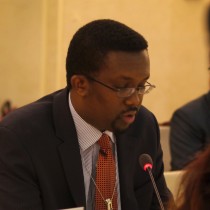
UN Human Rights Council: End continuing intimidation and attacks against Somali journalists
Addressing the ongoing 33rd session of the Human Rights Council (HRC) during the Interactive Dialogue NUSOJ Secretary General Omar Faruk Osman told the UN body with responsibility to promote and protect human rights around the globe: "…in Somalia, media freedom continues to be constrained by those seeking to use the mass media as a means to pursue their own interests. They have been doing this by using direct or indirect threats, but also by physical assaults, or in some cases even murders.”
"The statistics make for grim reading – four journalists, including two women, have been murdered since September 2015 and the latest journalist was gunned down this week in Mogadishu; five journalists have been wounded and 11 arrested; three media houses were closed down”.
In their briefing to the HRC the IFJ and NUSOJ said: "The latest killings are the continuation of an ongoing wave of violence against journalists across Somalia, and the serious risk to their lives and freedoms have led some journalists to stop covering critical issues of misuse of public office, corruption and the attacks by Al-Shabaab on government-controlled areas.
"In spite of numerous statements of condolences and assurances given by the Federal Government, attacks against journalists continue unabated as impunity remains unchallenged. While some Al-Shabaab suspects were caught, convicted of killing journalists and executed, media and journalists are finding it increasingly difficult to stand up for the virtues of journalism based on ethical traditions and values”.
In his speech to the HRC, Mr. Bahame Tom M. Nyanduga, the UN Independent Expert on Human Rights Situation in Somalia, said "in-spite of the adoption of the media law, media practitioners continue to complain about physical attacks, harassment, intimidation and arbitrary arrests by security forces, in particularly the National Intelligence Agency, NISA. Alleged intimidation has included closing of radio and television stations, confiscation of equipment, and prosecution of media personnel for reporting on insurgency. In one particular case, it is alleged that the Federal Government has interfered with the freedom of journalists to organise their free trade union. This matter was adjudicated by an ILO Tribunal. In March 2016, the ILO Governing Body adopted a recommendation in which it urged Somalia to desist from interfering with the activities of the National Union of Somali Journalists and the Federation of Somali Trade Unions.”
The Council also heard that a media law was enacted in January 2016 empowering courts to compel journalists to reveal confidential sources, forcing newspapers to register and be licensed, eroding the independence of the Somali Media Council, raising the bar for journalists to enter the profession by needing a university degree in journalism and be registered at the Ministry of Information before being recognised as a journalist. The law also gives the Ministry of Information power to police journalism by setting professional code of ethics for journalists.
The IFJ and NUSOJ accused the Ministry of Information of Somalia of using the National Intelligence and Security Agency to disband the General Assembly of NUSOJ in February 2016, thus undermining the rights to freedoms of expression, assembly, and association of NUSOJ and its journalist members.
"As a primary duty-bearer of international human rights law, the Federal Government of Somalia has failed to carry out independent and credible investigations of violations against journalists committed by government officials and their agents,” Osman told 47-member global rights body.
The IFJ called on the members of the UN Human Rights Council to urge the Somali government "to respect and uphold the right to freedom of expression and association and to protect journalists and trade unionists against harassment and intimidation for exercising their human rights; and to stop using the judiciary as a tool to silence trade unionists, journalists and other media practitioners.”
The IFJ welcomed the consensus over adopting a draft resolution on the human rights situation and the renewal of the Independent Expert on Human Rights Situation in Somalia Mr. Bahame Tom M. Nyanduga.
For more information, please contact IFJ on + 32 2 235 22 16
The IFJ represents more than 600,000 journalists in 140 countries
Leave a comment
| Copyright © 2009 - 2026 Sunatimes News Agency All Rights Reserved. |
| Home | About Us | Diinta | Reports | Latest News | Featured Items | Articles | Suna Radio | Suna TV | Contact Us |
 0
0 









UN Human Rights Council: End continuing intimidation and attacks against Somali journalists
The UN should urge the Federal Government of Somalia and its regional administrations to end the continuing intimidation, harassment and attacks against journalists, the International Federation of Journalists (IFJ) and its Somali affiliate the Natio